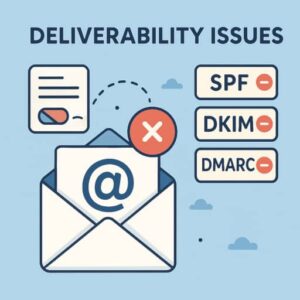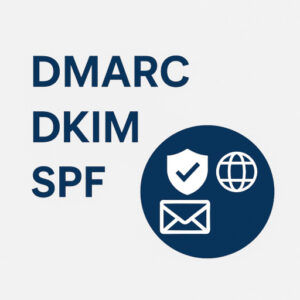03 Oct Why Domain Email Security Matters for Marketing Communication
Why Domain Email Security Matters for Marketing Communication
Behind every successful email campaign lies a properly secured domain.
Without it, even the most well-crafted messages risk ending up in the spam folder
The Challenge of Cold Email Outreach
Most companies rely on cold emails to generate revenue. Businesses spend countless hours refining their messaging, crafting compelling subject lines, and tailoring their approach to reach prospects effectively. But what if all this effort is in vain?
The Hidden Risk of Misconfigured Domains
Without proper domain email security in place, even the best-written emails may never reach the inbox of your prospects.
This is where domain email security becomes critical. Behind the scenes, every email sent is judged not only on its content but also on whether your domain is properly authenticated. Internet service providers (ISPs) and email platforms like Gmail and Outlook look for specific signals that prove your emails are trustworthy.

If these records are misconfigured or missing, your chances of ending up in the spam folder increase dramatically. Worse, cybercriminals can exploit weak domain security to impersonate your brand, damaging your reputation and eroding customer trust.

Cold Email Deliverability and Domain Reputation
Email providers constantly evaluate how trustworthy your domain is. When your domain reputation is poor, your messages are more likely to be filtered out before they reach the inbox.
This becomes especially critical when sending cold emails. Because cold outreach involves higher-than-usual email volume, it naturally attracts closer scrutiny from spam filters. Even legitimate campaigns can be flagged as suspicious if your domain isn’t properly authenticated.
Key Email Authentication Records Explained
Three essential authentication records determine whether your messages are recognized as legitimate or end up flagged as spam.
These records work together to verify that emails sent from your domain are genuine, reducing the risk of impersonation, phishing, and lost deliverability.

- SPF – Sender Policy Framework: SPF is a record that tells email providers which mail servers are authorized to send messages from your domain.
- DKIM – DomainKeys Identified Mail: DKIM adds a secure digital signature to every email your domain sends. This signature assures receiving servers that the message hasn’t been altered in transit and truly originates from your business.
- DMARC – Domain-based Message Authentication, Reporting & Conformance: DMARC ties SPF and DKIM together and gives you control over what happens when an email fails authentication. It also provides valuable reports that reveal who’s sending messages on behalf of your domain.
Together, these records verify that emails sent from your domain are genuine, protecting your business from impersonation, phishing, and poor deliverability.
How Can You Tell if Your Emails Are Secure (and Really Reaching Inboxes)?
You don’t need to guess whether your email security is set up correctly. The UK government provides an official service you can use to test your domain and verify your configuration.
Official UK government service to check your domain.
If the tool flags any issues with your SPF, DKIM, or DMARC setup, don’t worry. At IT and General, we can help you configure these records correctly, protect your domain against spoofing, and improve your email deliverability.


